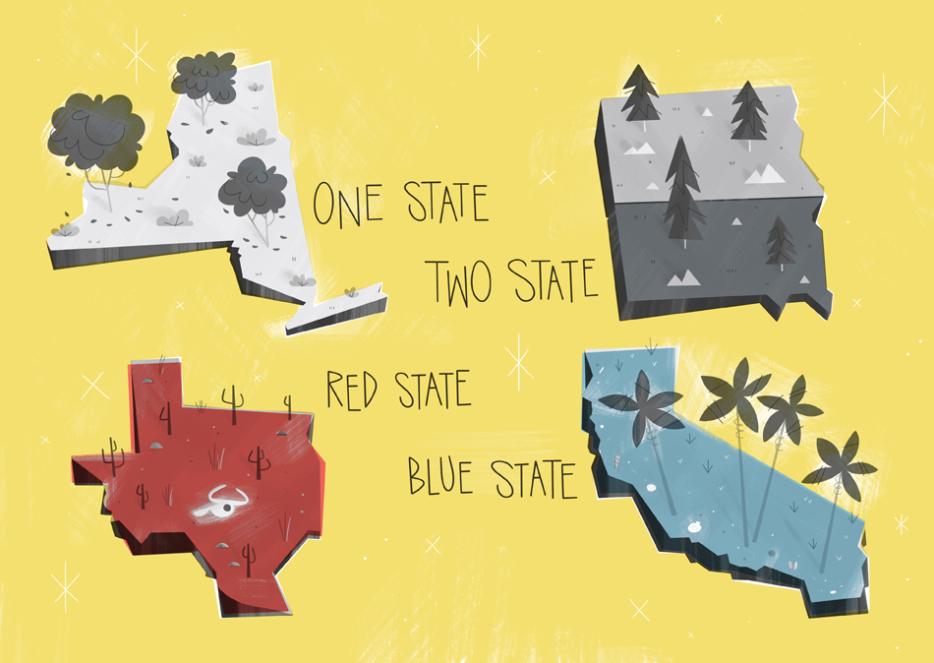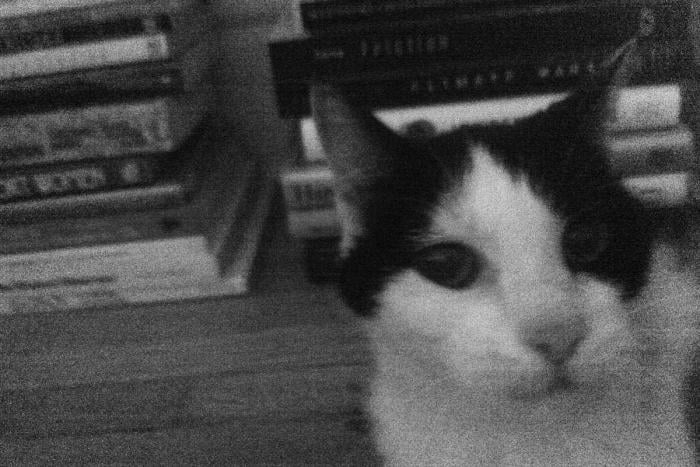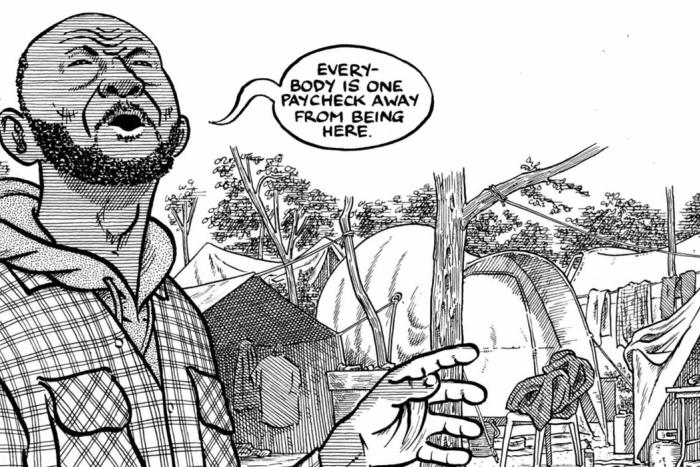Calvin Trillin is on the phone to talk poetry. He’s already started work on Dogfight, his follow-up to 2008’s Deciding the Next Decider: The 2008 Presidential Race in Rhyme, an epic retelling of Barack Obama’s victory and the events leading up to it, in iambic pentameter and rhyming couplets.
For me, the prospect of talking to Calvin Trillin is very much like going to a restaurant I’ve always wanted to go to—say Trillin’s beloved Arthur Bryant’s in Kansas City. It's the fulfillment of a very fond, long-held wish. But talking solely about his poetry is akin to only ordering cole slaw; I will always know there was a lot of brisket, fries and burnt endsBurnt ends are the flavour-packed, barky scraps of brisket pushed off to the side by the counterman as he slices. Before Trillin wrote about them in his book American Fried, they used to be given away for free. Now Arthur Bryant's charges $8.95 for them. I didn’t get to try. And a lot of brisket I didn't get to talk about, for that matter, since most of our other (imagined) conversations have been about food.
Calvin Trillin can certainly talk poetry. Since 1990 he has served as “deadline poet” for The Nation, producing weekly verse on the events of the day, and the recent author of two bestselling collections, Obliviously on He Sails and Heckuva Job, recounting the Bush Administration in rhyming verse. He’s also going on almost fifty years as a staff writer for The New Yorker, during which time he’s written numerous books, including memoirs (About Alice) and novels (Tepper Isn’t Going Out).
His wry and endearing personal accounts of food and travel (mostly food) collected in The Tummy Trilogy and Other Volumes were my introduction to Trillin’s writing. "Mao and Me," his fantasy, undeterred by the Chairman's death, of being appointed by the State Department to take Mao eating around New York for a week, spurred me to send my father (who had sent me the book) a fax (this was a long, long time ago) outlining the few certain blocks of Rue St. Laurent in Montreal we would eat our way up, undeterred by the fact that he was in New York and I was in Osaka, Japan.
To borrow part of a title, that's a heckuva menu.
Throughout this fall’s U.S. presidential campaign and the writing of Dogfight, I’ll be checking in with Trillin periodically to get his thoughts on the race as it unfolds, attempting to cajole him into making the type of Sunday talk-show predictions he so disdains—though the assuredness with which he responds to every question I ask tells me success is not likely—and trying to get at least a little taste of that brisket.
Poetically, not politically, what are your thoughts on the campaign so far?
They're not perfect names so far. I judge politics a lot by whether the names are good for rhyming and have good meter. And Romney is not a very good name, partly because the narrative poem is in iambic pentameter and Romney doesn't work very well. My best candidate would have been Ross Perot. Nice iambic beat to it. John McCain. But Mitt is good. And it rhymes with a lot of things.
I've often mentioned that Obama, who himself says he has an odd name, was a good name except I’ve used up all the rhymes with Osama Bin Laden... Yokohama... "Slap yo' mama..." So he's a problem too. This note is to remind myself next time to mention that "Bowlerama" is an excellent ryhme.
Herman Cain is a good rhyme. Gingrich I simply called "Newt," which made it easier. So it's shaped up poetically.
And of course the entertainment value of the Republican primary season is very high. I was a little concerned at the beginning when I agreed to do this book again. Unlike 2008, when I had both [presidential] primaries to write about, I would only have the Republicans this time. But theirs turned out to be really enough for two [books], particularly their lineup of candidates.
So the potential for material is richer this time around?
Last time it seemed fairly straightforward. I just can't imagine in 2008 people like Herman Cain and Donald Trump being at one time or another the leader in the polls. When people start taking Donald Trump seriously as a candidate, you know it's going to be an entertaining season.
Who do you miss from last time around?
I guess everybody misses Sarah Palin. I mean, people in what I call "the small-joke trade" certainly miss Sarah Palin. I had that kind of a song-inspired poem to her last time, the Barbra Streisand classic titled, "On a Clear Day I Can See Vladivostok,"The original song, "On a Clear Day You Can See Forever" is from the 1965 play (and 1970 Streisand movie) of the same name. because she claimed to know a lot about foreign policy because she could see Russia from Alaska. Which, you by the way you can't see unless you go to some obscure island where nobody knows who Sarah Palin is because they're totally cut off from the world.
But you miss the entertaining candidates. And I liked Huckabee because he was sort of… I wrote a poem about him called, "The Nicest Republican". He didn't seem to hate anybody.
How would you handle it if the pivotal event of the campaign turns out to be a terrible poetic opportunity? Somewhere hard to rhyme like East Orange? Does that possibility ever keep you up at night?
It's funny because I sometimes refer to Clinton as "the 'orange' of American presidents." That's a very bad name to rhyme. I put it in the middle of a line.
And the Tea Party, worse than rhyming, the meter is bad for iambic pentameter [of the main, narrative poem]... I don't know enough about what my family calls 'grown-up poetry' to know what you call the meter that some of the shorter poems [that interrupt the main poem] are written in, but one of them is about the Tea Party. Occasionally I do a kind of a parody song and this one was to the tune of "Matchmaker,” from Fiddler on the Roof.
[Singing] “Tea Party, Tea Party, something...”
So it is a problem that people aren't always considerate about my meter before they do something. The Tea Party is an example of that. But I think I've fixed it.
Reading back through the 2008 book, I was struck by how many of the same characters—not necessarily the same people but the same types—pop up again this time.
One of the reasons for that is that the Republican party, where most of the action has been throughout the primary season, has pretty much turned into an attempt to show how faithful you are to conservative principles. The point is trying to catch somebody in a non-right-wing act or statement. So it's a little different from actually arguing about issues.
And during the campaign there was an almost precise example of the same thing happening again. Huckabee, in 2008, was accused of letting undocumented immigrants go to universities in Arkansas with in-state tuition. That is, a kid is brought to Arkansas when he's a year old and he graduates high school and he's doing pretty well and he gets into the University of Arkansas and he gets to go under the in-state tuition rather than pay more for somebody from Missouri or Kansas or some place. Rick Perry [in Texas] was accused of the same thing in 2012—that is, letting people get educated.
And when you think about it, it's kind of a monumentally stupid thing. What society on earth has ever prospered by not educating people? But both of these were perceived heresies in what really has almost become an almost religious thing.
I don't mean Christian religion but a fealty to an ideal right-wing standard. And literally in some cases, like signing an oath like Grover Norquist puts out that you'll never raise taxes. Actually, literally signing an oath. It's like being in a church and promising never to do anything heretical. Conservative groups are very big on getting candidates to sign pledges, it seems, including one that they'll stay faithful to their wives. Apparently at least one candidate (ahem, Newt!) was hesitant to sign that one.
So they end up being the same sort of people because those are the only people who can run.
The worst accusation made against Romney throughout this whole thing is that he's a moderate. And there used to be actual moderates running! And in fact some of them got nominated and some of them got elected.
The people who have now taken over the Republican party—I shouldn't say "taken over" because sometimes the people in charge are more moderate than the candidates—have made it so the only person who has a chance in the party now is somebody who takes the oath.
Barry Goldwater couldn't run in a Republican primary now. Literally. Barry Goldwater, when he went back to Arizona, rejoined Planned Parenthood. He had either a grandson or a nephew who was gay and he was just cool about gay people. He could never run as a Republican and when he ran in 1964, the phrase often applied to him was that he was so far right he was “outside the mainstream of American politics.” But now he would be to the left of the Republican Party.
In terms of recurring characters, in the previous book you frequently referred to Giuliani as "the worm." You could substitute Newt in for Giuliani in a lot of cases this time around.
Yeah, in a way they're the same. They're candidates where people talk about the character issues. They're two people who you wonder whether people of that sort of character ought to be running for president. "Character" not meaning whether he goes to church every Sunday but whether, like Giuliani, he announces that he and his wife are splitting on television before telling her. I tried to find a clip of this. I really did. But searching on YouTube for Rudy Giuliani press conferences nets you a lot of one day and not a lot of anything else. But there is a 1993 Giuliani campaign ad you can find on YouTube in which Donna Hanover, the wife he separated from, enumerates his many virtues. “He’s honest... and he’s very kind.”
Or Gingrich. I've been writing some pieces, some short attempts at humour because I've been following the campaign so closely and one of them about Gingrich, and scenes conjured up by Gingrich's campaign, is entitled, "Calista Gingrich, Aware That Her Husband Has Cheated On And Left Two Seriously Ill Women, Tries To Make Light Of A Bad Cough." Because yeah, that is worm-like behaviour, no question about it. Not just because of the (correct) assertion that, compared to Calista, Newt is "not exactly her equal in the looks department," a Fox News comment piece which opined that Newt's serial infidelities would make him a good president, was just marvellous. To wit: "When three women want to sign on for life with a man who is now running for president, I worry more about whether we’ll be clamoring for a third Gingrich term, not whether we’ll want to let him go after one."
You’re pretty relentless in calling out the Sunday political show commentators, who you call the “Sabbath Gasbags,” for their weekly declarations of what is, in their minds, inevitable. Which almost always prove not to have been inevitable.
And I deal with that in the first chapter of this book because it's now mainly forgotten—certainly by the Sabbath Gasbags it's forgotten—that after the Obama victory they basically said that the Republican party was kaput. That was it. I mean, they were going to sort of disappear. They were lucky if they were going to win a couple of congressional races.
I have a book in front of me that says—I don't want to embarrass this guy so I won't say who it is—in April 2009, one of these political forecasters said, "The chance of Republicans winning control of either chamber in the 2010 midterm elections is zero." Not close to zero. Not slight. Zero. That was the quote. OK, well, they won the House. They almost won the Senate. These guys forget very quickly what they've predicted. Then, at one point, they predicted that Obama was through. So they're sort of entertaining but not relevant to what's going to happen.
I was going to ask you if you wanted to play the gasbag and call the race right now.
[Pauses.] No.
We could check in next time and see how your prediction’s doing?
What everybody says is that it's going to be very close and I just wrote another song parody called, "Why-oh Why-oh Why-oh Did I Ever Leave Ohio?" from "Wonderful Town," because there are only seven or eight states that are going to decide the election. So the rest of us might as well stay home—the election’s basically going to be fought in battleground states because of the Electoral College. So you're really talking about what's going to happen in Ohio and what's going to happen in North Carolina and what's going to happen in Michigan, etc.
Anyway, we'll see again next time. I think the answer will still be no, but we can talk about it. Even if it's Jesse Owens over Ralph Metcalfe in the 100 metres at the 1936 Olympics, I vow to get Trillin to predict the winner of a race. Any race. You have my word.






